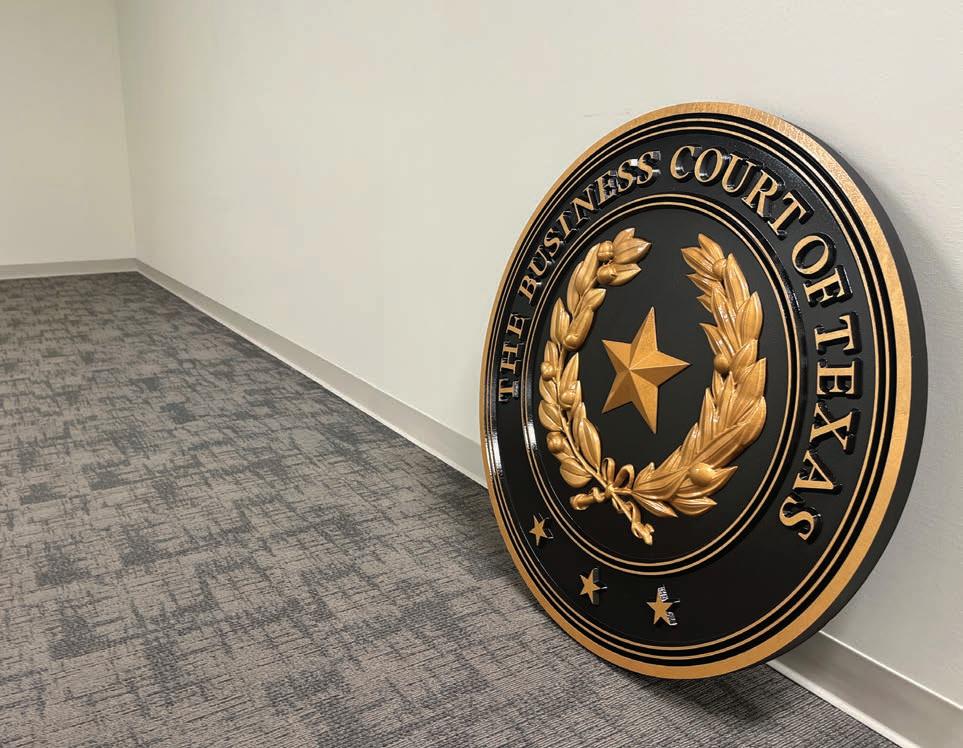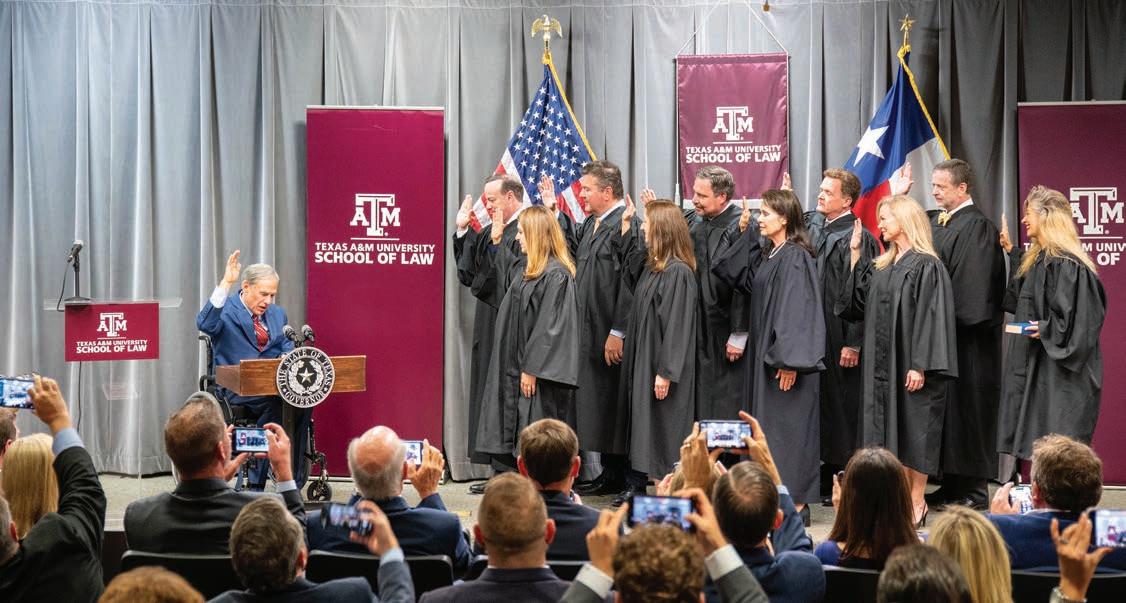
8 minute read
Early Opinions Bring New Court into Focus
The Texas Business Court, Part IV
By The Honorable Stacy Sharp and Jordan Long
The new Texas Business Court is up and running. After operating in temporary office space for the first eight months, the staff of the Court’s Fourth Division moved into its bright and comfortable new chambers in May. Located on the fourth floor of One Alamo Center, the chambers are in downtown San Antonio, just down the street from the Bexar County Courthouse. While the Division is still awaiting the arrival of its permanent furniture, the transition to our permanent facilities was a welcome and exciting one. The hard-working staffers at Texas’s Office of Court Administration, headquartered in Austin, have poured much time and expertise into the chambers’ design and construction, along with overseeing the technological, personnel, and other procurement-related needs involved in launching a brand-new court. Meanwhile, construction of the Division’s hearing room is underway, with the initial design phase having concluded and completion anticipated later this year. The hearing room adjoins the new chambers and will handle most of the Division’s nonjury matters for cases in which venue lies in Bexar County.
As the five Business Court divisions settle into their respective locations across the state, their cases are progressing. At the time of writing, the Court’s first trial is set for this September, and the Court has issued over thirty written opinions. Those opinions include several first-impression issues related to Business Court litigation:
With over 150 cases filed, the Texas Business Court will continue to pursue its mission of adding stability and predictability to the Texas legal landscape by issuing written opinions that answer the procedural and substantive questions arising in this new commercial-litigation forum.
Pleading into the Business Court
The Business Court has begun articulating the pleading standards required to invoke or challenge its jurisdiction. The Court has resolved that Texas’s well-established plea-to-the-jurisdiction standard will apply in Business Court cases. C Ten 31 LLC v. Tarbox, 2025 Tex. Bus. 1, ¶ 46, 708 S.W.3d 223, 242 (3d Div. 2025); ET Gathering & Processing LLC v. Tellurian Prod. LLC, 2025 Tex. Bus. 11, ¶ 7, 709 S.W.3d 1, 4 (4th Div. 2025). In the removal context, when the removing party pleads that the value of the rights at stake are within the court’s jurisdiction and the petition does not plead otherwise, the party moving for remand bears the initial burden to show the amount pleaded is a sham, or that a different amount is readily established. C Ten, 708 S.W.3d at 243. In C Ten, Austin’s Third Division rejected the argument that a removing party must attach evidence of the amount in controversy to prevent remand. Id. at 239. And in ET Gathering, the Fourth Division’s Judge Marialyn Barnard denied a plea to the jurisdiction where the petition adequately asserted that the amount in controversy exceeded ten million dollars, reasoning that the pleading should control. ET Gathering, 709 S.W.3d at 5. The party’s petition amendment adding new facts to invoke the Business Court’s jurisdiction did not indicate the amount pleaded was a “sham.” Id. at 4-5.

Business Court Jurisdiction
The Court can hear actions “arising out of a qualified transaction” worth ten million dollars or more. Tex. Gov’t Code § 25A.004(d)(1). In an action involving promissory note assignments, the First Division in Dallas sua sponte addressed its jurisdiction under this clause, concluding that “arising out of” denotes a broad causal relationship akin to but-for causation. Atlas IDF, LP v. NexPoint Real Est. Partners, LLC, 2025 Tex. Bus. 16, ¶ 29, 2025 WL 1381574, at *3 (1st Div. 2025). The Court resolved it could exercise jurisdiction in Atlas, reasoning that even where the promissory notes were not initially valued at ten million dollars, the parties in that case may have placed a higher value on the transaction, reasonably expecting the amount of interest to grow before payment was demanded. Id. at ¶ 36.
This broad statutory construction was followed by an opinion issued in May, which limited the definition of qualified transactions. The Court’s Eighth Division ruled that prospective transactions are not “qualified” ones for purposes of the statute conferring jurisdiction. G-Force & Assocs., Inc. v. Bloecher, 2025 Tex. Bus. 18, 2025 WL 1397069 (8th Div. 2025). While no payment need yet have changed hands, a transaction does not satisfy the jurisdictional definition unless the parties were at least bound to perform their mutual obligations. Id. at ¶ 18.
Upon reading the Business Court’s enabling legislation, many in the legal community initially assumed the clause granting jurisdiction over actions seeking injunctions or declaratory judgments would apply to any suit requesting such equitable relief. However, the Third Division has now disavowed that notion, holding the statutory grant of jurisdiction for suits seeking equitable relief incorporates the applicable monetary-threshold requirements.
C Ten, 708 S.W.3d at 231. The amount in controversy in such actions is measured by the value of the rights at issue. Id. at 233.
Scope of Fiduciary Duties
Roughly half of the Business Court’s cases involve a business entity’s internal-affairs dispute. Not surprisingly, then, these suits often allege fiduciary breaches by a company’s governing officers, members, or directors. In March, the Court clarified the scope of those duties in the context of a partnership agreement that required partners to act in good faith but disclaimed any fiduciary duties. Primexx Energy Opportunity Fund, LP v. Primexx Energy Corp., 2025 Tex. Bus. 9, ¶ 96, 709 S.W.3d 619, 642 (1st Div. 2025). What duties remained, the Court concluded, included a limited duty of candor, but no discrete duty to act in the best interest of the partnership. Id. at 646, 654.
The next month, the Court analyzed a related question in the Rule 91 context.
The Eighth Division strictly adhered to the plain language of the company’s operating agreement, declining to find any informal fiduciary duty between co-members of an LLC and finding the fiduciary breach claim “legally baseless.” See Tall v. Vanderhoef, 2025 Tex. Bus. 15, 2025 WL 1165208 (8th Div. 2025) (mem. op.).
Meanwhile, the Governor signed Senate Bill 29 into law in May. Among other changes, the new bill codifies the business-judgment rule and creates a rebuttable presumption that corporate directors act in good faith. Tex. S.B. 29, § 11. 89th Leg., R.S. (2025).
Business Court Procedural Issues
The creation of a new court naturally triggers new questions in Texas civil procedure. In February, the First Division in Dallas was faced with the novel procedural question of whether an appearance in a state district court would be deemed a general appearance for purposes of consenting to personal jurisdiction in a Business Court suit. Primexx Energy Opportunity Fund, LP v. Primexx Energy Corp., 2025 Tex. Bus. 5, 2025 WL 446345 (1st Div.). The Court ruled it was.
The same month, Austin’s Third Division weighed in on a removal-procedure issue, declining to adopt a party’s argument that the statutory thirty-day removal deadline can run before a lawsuit is filed—regardless of when a party discovered facts that would grant the court jurisdiction over a future, potential lawsuit. Safelease Ins. Servs. LLC v. Storable, Inc., 2025 Tex. Bus. 6, 707 S.W.3d 130 (3d Div. 2025).
A few months later, the Eleventh Division faced the question of whether the Business Court statute, which allows venue to be established by a written contract, overrode the doctrine enforcing venue selection clauses only where the contract is a “major transaction” stating a value of $1 million. NGL Water Sols. Permian, LLC v. Lime Rock Res. V-A, L.P., 2025 Tex. Bus. 20, 2025 WL 1445867 (11th Div.) (mem. op.). The court answered the question in the negative. Id. Absent a major transaction, the real property mandatory venue controlled, requiring dismissal for lack of venue. Id.
With over 150 cases filed, the Texas Business Court will continue to pursue its mission of adding stability and predictability to the Texas legal landscape by issuing written opinions that answer the procedural and substantive questions arising in this new commercial-litigation forum.









